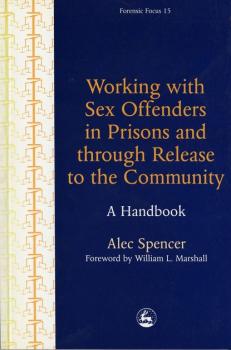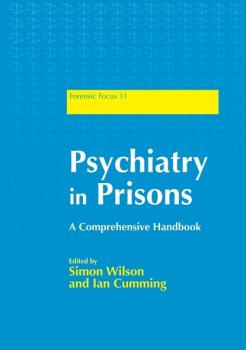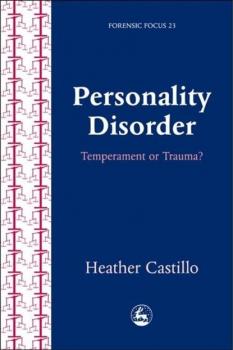ТОП просматриваемых книг сайта:
Forensic Focus
Скачать книги из серии Forensic FocusWorking with Sex Offenders in Prisons and through Release to the Community - Alec Spencer
Forensic FocusАннотация
Working with Sex Offenders in Prisons and through Release to the Community is the first study of its kind to look at a wide range of issues and problems relating to the management of sexual offenders in prisons and their reintegration into the community. Spencer's analysis of the delivery of prison-based offence-specific programmes, both within the broader context of criminal justice systems and the community provides valuable insight into the relationship between prisons and other agencies dealing with sex offenders. Spencer makes a strong case for implementing treatment for sexual offenders within prisons, as well as the need for support and supervision in the community once released. His multi-agency approach is an innovative and cohesive strategy for effective interventions, and highlights major issues which need to be addressed so that programmes stand a chance of succeeding in a penal setting. The issues involved in the setting up of programmes, the creation of the right environment, and the support and training of staff, are universally applicable; as are discussions of risk assessment, the links between victims and offenders, sex offenders in special hospitals, women as sex abusers, the use of pornography and sexual offender notification. This book is essential reading, not only for specialists in the field, but also for students and professionals working in related areas.
Professional and Therapeutic Boundaries in Forensic Mental Health Practice - Группа авторов
Forensic FocusАннотация
People who use forensic mental health services are defined by the fact that they have violated boundaries, often in many ways. For clinicians employed to work therapeutically with this client group however, the capacity to initiate and maintain boundaries is critical to safety as well as to good treatment outcomes. This book provides a thorough introduction to the subject of professional and therapeutic boundaries and their particular complexities within forensic mental health settings. The contributors, all experts in their respective fields, address the challenges of establishing working boundaries within forensic mental health services from multiple perspectives. They explore the ways in which boundaries can be initiated and maintained in different areas of forensic mental health work, including in psychotherapy, mental health nursing, arts therapies, forensic psychiatry and family therapy, and when working with different client groups, including children and adolescents, offenders with severe personality disorders in high security settings and sex offenders. Consideration is also given to boundaries and homicide, maternal boundary violations and boundaries in a forensic learning disability service. This authoritative, interdisciplinary resource will support all forensic mental health practitioners in this crucial aspect of their work.
Аннотация
This groundbreaking book explores the psychodynamics and socio-politics of the forensic therapeutic milieu, addressing some of the most difficult and complex issues facing practitioners. It sets out a psycho-social framework for understanding the predicament and the needs of those who live in and those who work in forensic mental health settings. It brings to life the thinking of those working on the frontline in an increasingly difficult and hostile environment, and draws together fresh and stimulating approaches to engagement with highly complex individuals who present challenges to traditional models of psychiatric assessment and treatment. Contributors with considerable clinical experience and expertise from a range of disciplines consider the ethical, emotional and intellectual challenges of their work, and describe ways in which genuine containment and change can be achieved despite numerous perceived assaults on therapeutic relationships, and on the therapeutic milieu itself. Combining clinical case studies with organisational perspectives and clear descriptions of theoretical processes, they explore key issues including the challenges of maintaining role-appropriate, 'boundaried' relationships; the tensions between public protection and individual confidentiality; questions of risk and responsibility; duty of care and respect for individual liberty; the challenges posed by inter-professional tensions and rivalries; as well as specific clinical dilemmas. The difficulties they experience in fulfilling specific therapeutic roles in the face of uncertainties about the funding and commissioning of their services are addressed, and the final part of the book outlines some of the ways in which individuals, particular services and whole organisations may protect themselves when under attack. This unique and highly original book is essential reading for all those working, or training to work, in both forensic and non-forensic inpatient therapeutic milieux and for academics and lay readers interested in the societal dynamics of inclusion and exclusion that are replicated and magnified in these settings.
Аннотация
Psychiatry in Prisons provides a comprehensive overview of the history, problems and development of psychiatric health care in prisons, focusing particularly on the UK. The contributors tackle a broad range of issues, from familiar mental health issues such as substance misuse, self-injury and health screening to complex legal, moral and philosophical dilemmas. It also draws comparisons with the US correctional mental health system and the delivery of mental health services in New Zealand prisons. This comprehensive guide is an indispensible resource for psychiatrists, psychiatric nurses, prison medical officers, probation officers, prison discipline staff and any other professionals concerned with mental health care in custodial settings.
Аннотация
Sexual Offending and Mental Health draws together theoretical, clinical and mental health issues for the range of professionals working in the community and in-patient settings with sex offenders and those who have behaved in sexually inappropriate ways. The contributors describe current influential models of sexual offending and the developmental, psychological and social factors involved. They discuss the prevalence of personality and mental disorders in known sex offenders and the impact these disorders have on their treatment and management. They describe clinical work with individuals, their partners and families, and also consider the impact of this work on professionals. The book includes an outline of current approaches to risk assessment, an overview of the recent changes in legislation in England and Wales, and suggestions for multi-disciplinary management in the community. This book will be essential reading for professionals working in health or criminal justice settings with people who have committed sexual offences or whose sexual behaviour has caused concern for others.
Аннотация
John Woods presents a theoretical approach and practical suggestions for mental health practitioners working therapeutically with young people who have abused. Drawing on his long-standing experience, he has developed an integrated theory that bridges the gap between existing cognitive behavioural and psychoanalytic approaches. He shows how this individual treatment model can be applied in a range of contexts including residential settings, group and family work, as well as in individual work. In-depth case studies throughout the book demonstrate how exploring the individual's whole life-course within a psychoanalytic framework enables connections to be drawn between possible childhood abuse and subsequent abusive behaviour. Guidelines are presented on working with the problems of self-destructiveness, masochism and depression facing the young abused/abuser and the impact of sexual abuse on sexuality, gender identity and sexual orientation. This is an instructive and thought-provoking text for all mental health practitioners and allied professionals working with adolescents who sexually offend.
Аннотация
Personality Disorder (PD) is one of the most difficult psychological conditions to classify and treat and in the past literature on the subject has tended to neglect the invaluable viewpoint of sufferers themselves. Drawing on extensive research carried out in conjunction with service users, Heather Castillo seeks to adjust this imbalance and looks at the classification and treatment of PD from the service users' viewpoint. This book emphasises the need for health professionals to reassess their approach to the condition and allows those with PD to effectively define themselves and their illness. With a wide range of case study material and analysis, this book is essential reading for mental health professionals, workers in the voluntary and forensic sectors and service users themselves.
Аннотация
Working in any area of mental health nursing presents complex issues regarding the nurse-patient relationship. For those working in prolonged clinical contact with offenders, relationships with patients and colleagues can be particularly emotionally intense and sometimes difficult to express. This book attempts to understand and articulate the emotional labour of forensic nursing and explores the challenge of establishing and maintaining therapeutic relationships with offenders. The first book to consider the emotional and relational component of forensic mental health nursing, the chapters cover a number of specialist forensic areas from this psychodynamic perspective, such as women's services, services for people with personality disorders, intensive care, high security psychiatric hospitals, medium secure units and services for adolescent offenders. A chapter on therapeutic communities is also included, along with chapters on challenging relational phenomena such as working with hate and the difficulties of managing difference when working in environments that produce high levels of anxiety. Therapeutic Relationships with Offenders provides essential information for mental health nurses working in the forensic field and will be of interest to any professionals working with challenging populations and people with personality disorders.
Аннотация
Personality Disorder offers a comprehensive and accessible collection of papers that will be practically useful to practitioners working in secure and non-secure settings with patients who have personality disorders. This book brings together fourteen classic papers, which address the impact that working with personality disorder patients can have on staff. It also offers theoretical explanations for personality disorder, and explores other issues such as the concept of boundaries in clinical practice, psychiatric staff as attachment figures and the relationship between severity of personality disorder and childhood experiences. Each paper is introduced with contextual material, and is followed by a series of questions that are intended to be used as educational exercises. This book will be essential reading for clinical and forensic psychologists, psychiatrists, community psychiatric nurses, social workers and students.
Аннотация
Adolescents with developmental disabilities are a complex population who require specialised treatment and care. This interdisciplinary text examines the processes involved in working with this client group in forensic settings, and explores the ways in which their needs differ from those of other young people who engage in high risk behaviour or offending. The book covers assessment, intervention and treatment options for adolescents with a wide range of developmental disabilities, including autism spectrum disorders, acquired brain injury, developmental traumatology, and complex comorbidities. It describes the obstacles, challenges and opportunities to consider when working with this population, and the role played by various professionals, including forensic psychiatry and psychology, occupational therapy, physiotherapy, education, art psychotherapy and social work. The book also outlines the issues to consider when working in secure and community settings as well as the legal aspects of working with this client group, and the complex issues surrounding risk assessment. The first comprehensive account of forensic issues in adolescents with developmental disabilities, this book will be an indispensible primary resource for a wide range of professionals, including child and adolescent psychiatrists, community psychiatric nurses, developmental paediatricians, social workers and youth workers, lawyers and advocates.










